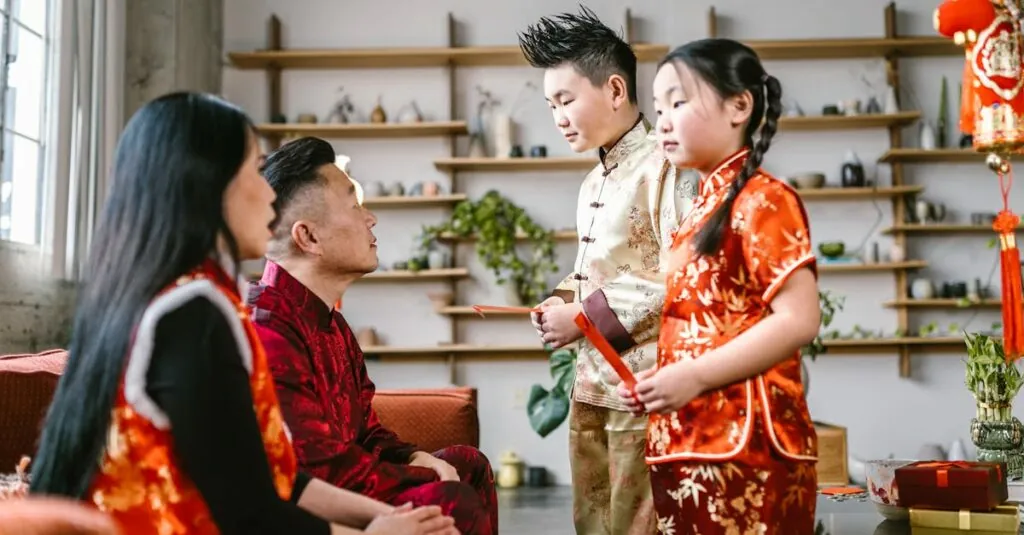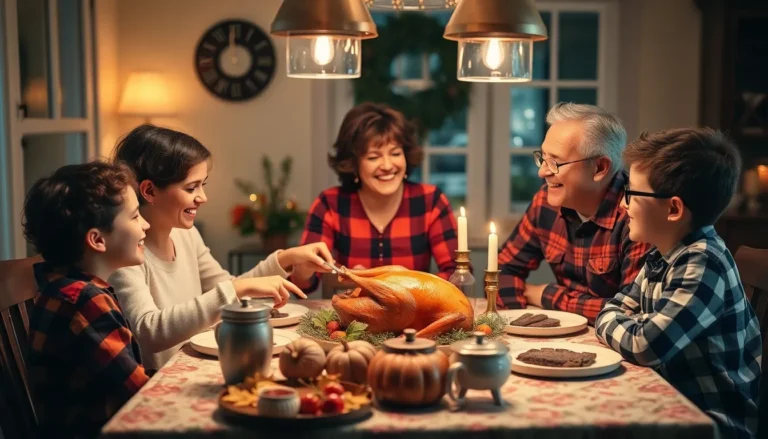Table of Contents
ToggleChinese family traditions are a rich tapestry woven through centuries of history, culture, and a sprinkle of good fortune. From the vibrant celebrations of the Lunar New Year to the heartwarming customs surrounding family gatherings, these traditions offer a delightful glimpse into the values that shape Chinese society. Picture a table overflowing with dumplings, laughter echoing through the air, and the wise words of elders guiding the younger generation—it’s a scene that warms the heart and tickles the funny bone.
Overview of Chinese Family Traditions
Chinese family traditions encompass a variety of customs that reflect deep-rooted cultural values. Family bonds hold immense importance in Chinese society, influencing daily life and significant events alike. Celebrations often revolve around core values such as respect for elders, unity, and ancestral reverence.
During the Lunar New Year, families engage in lavish feasts and elaborate rituals. Special dishes, including dumplings and fish, symbolize prosperity and unity. Families clean their homes to sweep away bad luck, welcoming a fresh start in the new year.
A key aspect of these traditions involves honoring ancestors. Many families maintain ancestral altars, where offerings of food and incense are made during important occasions. This practice reflects the belief that ancestors remain an integral part of the family’s life.
Traditions also emphasize intergenerational relationships. Elder family members share wisdom and guidance, fostering respect among younger generations. Children often bow to their elders during celebrations, showcasing their gratitude and acknowledgment of family hierarchy.
Festivals serve as occasions for family reunions. Regardless of distance, members prioritize returning home to celebrate together. This unity reinforces the importance of familial ties, demonstrating a commitment to maintaining relationships.
Weddings present another example of family traditions in Chinese culture. Ceremonies feature intricate rituals, blending modern influences with ancient customs. A focus on family harmony and the joining of two families highlights the significance of these events.
Every custom reflects the vibrant cultural heritage of China. Traditions, celebrating family cohesion, continue to thrive amidst modernization, ensuring that the essence of familial bonds remains strong.
Importance of Family in Chinese Culture
Family holds a pivotal role in Chinese culture, deeply influencing social interactions and personal values. This significance roots back to ancient philosophies, guiding relationships and traditions.
Confucian Values
Confucianism emphasizes the importance of familial relationships. Filial piety serves as a cornerstone, stressing respect and loyalty to family. Through teachings, individuals learn to prioritize family over self-interest, fostering harmony within households. Confucian principles promote strong bonds, encouraging members to support and care for one another, thus preserving family unity. This worldview shapes many social norms, embedding the idea that the family is foundational for societal stability.
Respect for Elders
Respecting elders is a deeply ingrained value in Chinese families. Elders serve as the repositories of wisdom and culture, guiding younger generations. This respect manifests in various ways, including language and gestures, like bowing. Younger members often seek advice and listen to the experiences shared by older family members. Celebrating milestones, such as birthdays or anniversaries, also reflects this reverence. These traditions not only honor elders but strengthen intergenerational connections, ensuring that familial heritage is cherished and passed down.
Key Chinese Family Traditions
Chinese family traditions encompass a variety of customs that emphasize respect, unity, and continuity. These practices are deeply embedded in cultural identity.
Festivals and Celebrations
Chinese festivals, particularly the Lunar New Year, highlight the significance of family ties. Families gather to share lavish meals, showcasing dishes that symbolize wealth and happiness. Fireworks and dragon dances create an atmosphere of joy and excitement. Celebrating the Mid-Autumn Festival involves mooncake exchanges and storytelling, reinforcing family connections. During these events, honoring heritage and sharing traditions become a priority, fostering a sense of belonging.
Family Gatherings and Meals
Family gatherings stand as a cornerstone of Chinese culture. Regular meals strengthen familial bonds and provide opportunities for elders to share wisdom with younger generations. Special occasions see an array of traditional dishes, each carrying unique meanings tied to luck and prosperity. Seating arrangements often reflect hierarchy, illustrating respect for elders. Gathering around the table creates a lively environment where stories and laughter abound, making each meal a cherished memory.
Ancestral Worship
Ancestral worship holds a vital place in Chinese family traditions. Families maintain altars adorned with photographs of ancestors, reflecting profound respect and gratitude. During significant events, offerings of food and incense demonstrate reverence for those who came before. Rituals connect generations, reinforcing the notion that family lineage is sacred. Ancestral veneration fosters continuity, ensuring that stories and values pass through the ages. Each act of remembrance strengthens the bonds within the family, intertwining past and present.
Modern Influences on Chinese Family Traditions
Today’s Chinese family traditions face modern influences that reshape their dynamics and practices. Urbanization plays a significant role in altering family relationships and structures.
Urbanization and Family Dynamics
Urbanization in China leads to smaller family units as many young people move to cities for work. Those shifts create a trend where nuclear families replace extended ones. Larger families that once included multiple generations often become dispersed, reducing regular interactions. Loneliness can sometimes increase among elders left behind in rural areas. Adapting to these changes, families often rely on technology to maintain connections through video calls and social media. These tools help bridge distances and foster communication among family members.
Integration of Western Practices
Western practices integrate into Chinese family traditions, influencing celebrations and daily routines. Families now often celebrate holidays like Christmas and Thanksgiving alongside traditional Chinese festivals. This merging of customs reflects a broader cultural exchange and adaptation. Younger generations embrace Western values, promoting individualism and career focus over traditional expectations. In family settings, shared meals may include both Chinese dishes and Western favorites, highlighting this fusion of cultures. These influences create a more diverse family life, blending longstanding customs with new practices.
Regional Variations in Chinese Family Traditions
Chinese family traditions exhibit significant regional diversity shaped by geography and culture.
Southern vs. Northern Traditions
Northern traditions often emphasize hearty meals, with dumplings taking center stage during celebrations like the Lunar New Year. Families gather to prepare these symbols of prosperity, creating a strong sense of unity. In contrast, Southern traditions highlight rice as a staple, with dishes featuring seafood and vegetables reflecting the region’s agricultural richness. Family reunions in the South frequently include elaborate teas and pastries, symbolizing good fortune. Differences in dialect and cuisine show how regional influences shape family customs, ensuring that traditions remain vibrant and celebrated.
Ethnic Minority Practices
China’s ethnic minorities contribute unique customs, enriching the overall tapestry of family traditions. Tibetan families, for example, value communal meals and spiritual rituals centered around local deities. These gatherings often include folk songs that foster togetherness. Similarly, the Miao and Yao people commemorate important events with colorful festivals, where traditional dress showcases cultural identity. Each ethnic group’s practices celebrate family bonds while preserving distinct heritage, reinforcing the diversity within Chinese culture.
Chinese family traditions are a vibrant expression of cultural identity and values. They emphasize the importance of familial bonds and intergenerational connections that have stood the test of time. As families navigate modern influences and urbanization, these traditions adapt while still honoring the past.
The blend of ancient customs with contemporary practices showcases the resilience of family ties. Whether through festive gatherings or rituals honoring ancestors, the essence of Chinese family life continues to thrive. This enduring commitment to family ensures that the wisdom and values of previous generations remain alive, fostering unity and continuity in an ever-changing world.







